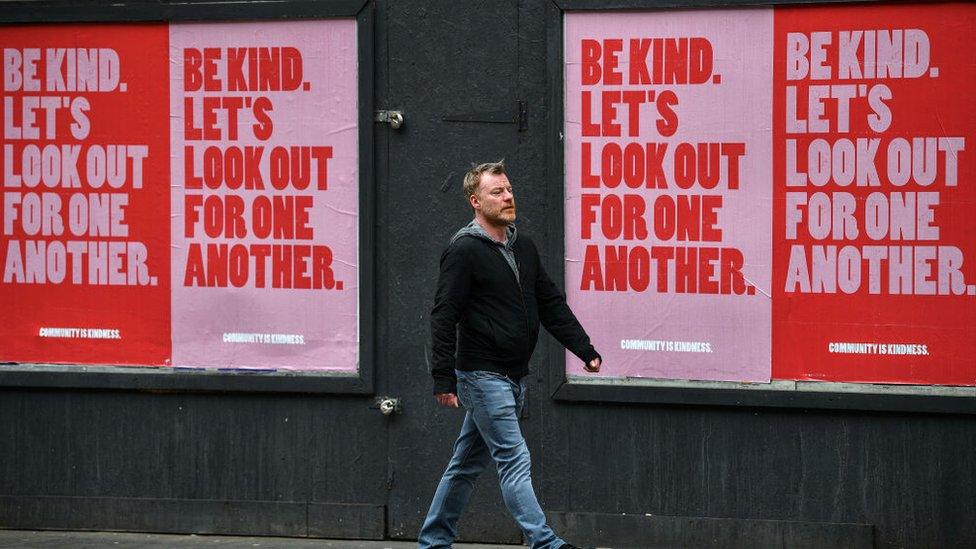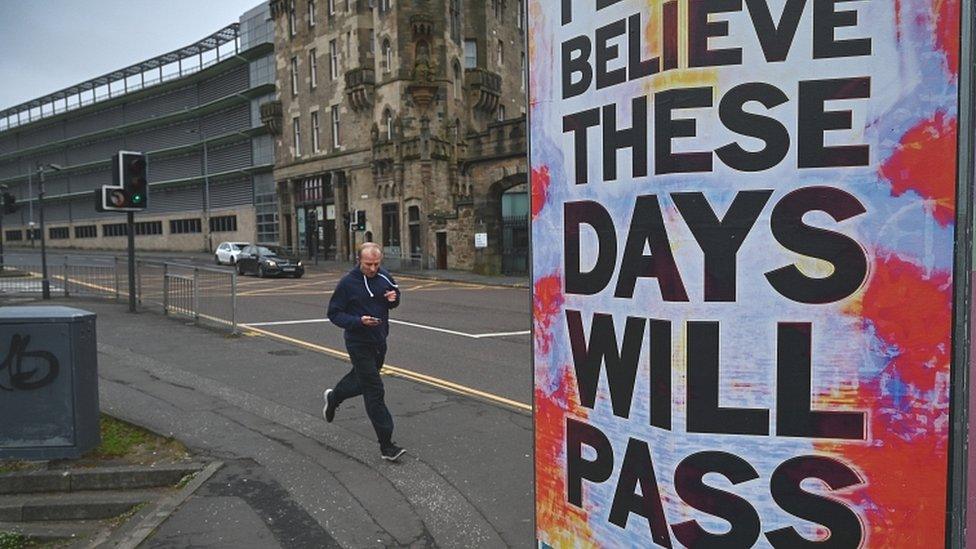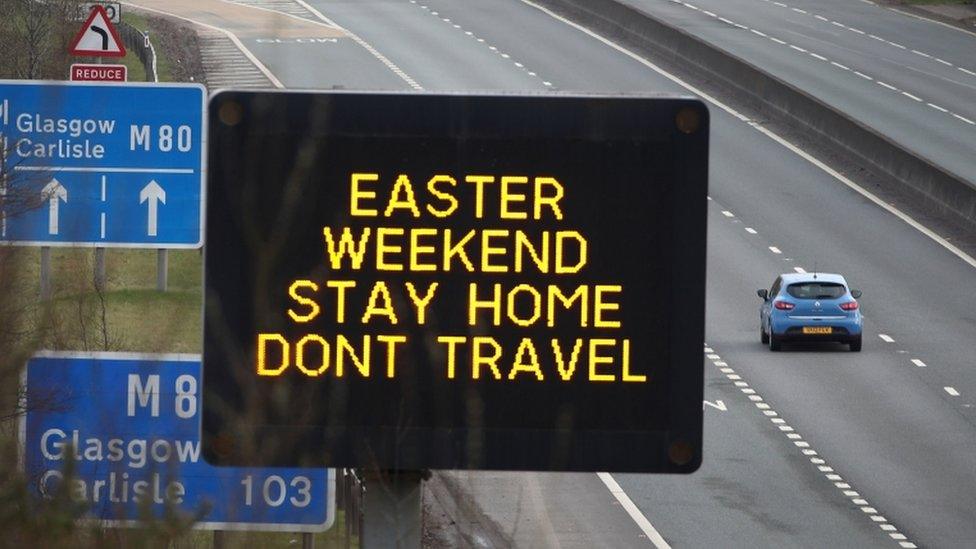Coronavirus: 'A question of balance' over lockdown exit
- Published

The Moody Blues were at the height of their fame in the 1960s and 70s
When I was younger, I was quite an adherent of the popular beat combo known as The Moody Blues. It is curious how many of their album titles can be made to fit within the world of politics.
Think of "On the Threshold of a Dream". Could be the soundtrack for the launch of pretty well any party manifesto.
Or the promise inherent in "To our Children's Children's Children". Or "Every Good boy deserves Favour". Or, for today's circumstances, "Strange Times".
But it was another oeuvre which came, unbidden, to mind today as I listened to the first minister expounding on the "horrendously difficult" decisions which are confronting governments everywhere over how and when to exit from the measures designed to combat coronavirus.
I thought of "A Question of Balance". And it struck me, as I heeded her words, that the question is not solely a medical one. Predominantly, yes, but not solely.
Be clear, we are not there yet. Nicola Sturgeon, UK ministers and their advisers are united in stressing that the signs are not sufficiently propitious to admit of any slackening in the remarkable constraints currently being imposed upon a mostly compliant public.
But we will get there at some point. This cannot endure for ever. And one reason for saying that is the consideration that persistent, enduring lockdown would risk damaging our economy and social fabric beyond repair.
To the point, perhaps, where the cure would be worse than the ailment.
The lockdown is designed to slow the spread of the virus. To minimise community transmission and thus to lessen the instant impact of the disease upon the public and, hence, upon the already stretched health service. I get the concept.
Scotland's First Minister urged people to stay at home over Easter weekend.
But how long will this persist? Or, more accurately, what parameters will we use to judge the point at which it is comparatively safe to ease the constraints?
One parameter, self evidently, will be the health stats which open each news briefing, in Edinburgh or London. The numbers infected, the numbers in hospital, the numbers in intensive care. And the mortality rate.
When those peak - or form the inverted parabolic curve admirably described today by Professor Jason Leitch - then we can begin to presume that the vicious grip of the virus is beginning to lessen. Note my choice of words. "Beginning" and "comparatively".
Because we cannot wait until every trace of the virus has been expunged. Until every conceivable risk of infection has been eradicated. It is impossible to say how long that would take - but it would be an exceptionally prolonged time scale.
And meanwhile? More businesses will fail. More enterprises will fold. Less and less of our economy, of our way of life will endure. The road to recovery, post virus, if such a thing can be envisaged at the present moment, will be more challenging still.
As with other political leaders, the first minister is very well aware of this. She chaired a meeting of her cabinet's sub committee on the economic impact of the virus today. She and her colleagues are assessing the damage.

Ms Sturgeon said that, while the health crisis takes precedence, she also had to consider the concomitant economic crisis. That too, she said, was "at the front of our thinking".
Indeed, she argued that a heightened economic crisis could itself have health consequences - both physical and mental - by worsening poverty and inequality.
From which I adduce that the calculation on an exit strategy will be a question of balance. We will seek to find the earliest possible point to return to an approximation of normality not least because, if we don't, we risk creating yet more havoc to our fundamental economic and social structures. Our business, our universities, our schools, our life.
Yet, that decision must be taken in concord with the health calculations. Those factors must be paramount, but not exclusive. We must return to a version of normality - but at a time consistent with a reasonable assessment of the decline in the grip of the virus.
That decision or that blend of decisions could arise in a few weeks' time. Across Europe, there are one or two encouraging signs. Tiny, but evident. We may follow that course, as we have all too tragically followed the path of disease and death.
Which leaves other difficult questions. If and when we exit from lockdown, will we do it uniformly across the UK? Or could Scotland exit at an earlier point, perhaps driven by the comparative stats north of the border?
'Unity of endeavour'
The first minister stressed that she would not hesitate to consider distinctive Scottish action in the light of distinctive Scottish evidence, should such emerge. She has a team of advisers assessing just that.
However, I do not think she was particularly encouraging such a prospect. Indeed, she repeatedly stressed the advantages thus far of pursuing a four nations collective approach within the UK.
Consider. If Scotland - or a region of England - were to be granted early exit status, it would inevitably create resentment in those areas still under lockdown. It would undermine the very unity of endeavour which has been displayed until now.
So, for now, expect the common purpose to persist. Expect the media - and opposition leaders - to pursue our governments over strategy, over the provision of PPE, over support for business and individuals.
Today, for example, Ms Sturgeon was questioned over an apparent disparity between the business support in Scotland - which seemingly involves a single payment per firm - and that prevailing in England where there can be payments by premises.
The first minister said that Scotland's choice had been to widen the scope of businesses covered, by comparison with England, and to help particular sectors. But she pledged to keep this under review. Expect the Tories, for one, to pursue this.
And thus lockdown persists - with the Chief Constable, Iain Livingstone stressing that the vast majority of citizens were obeying the rules and that the police tactic was to cajole and persuade, while reserving the right to impose sanctions where necessary.
A floral update, to close. You may recall that I told you how a single, insolent bud had emerged on the camellia bush in my garden. Checked a short time ago. There are now five flowers. This too will pass.
- Published2 April 2020

- Published10 April 2020

- Published10 April 2020

- Published22 July 2020

